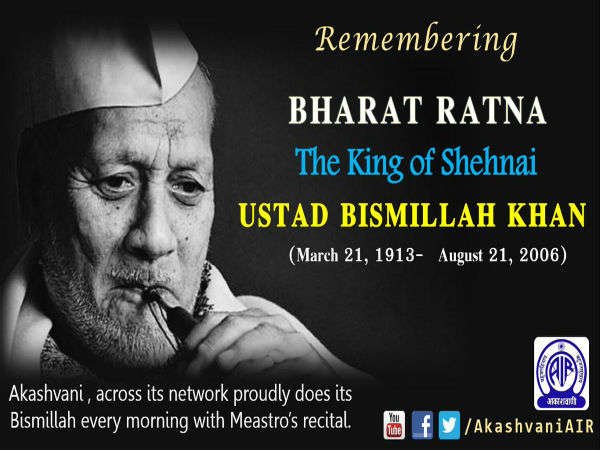1913: Bismillah Khan, Shehnai Maestro, Was Born

Bismillah Khan, India's most acclaimed shehnai player who was exclusively in charge of hoisting the status of the shehnai from a modest melodic instrument to an epicurean's enjoyment, was conceived on 21 March 1913 in Dumraon (Bihar). His folks, Paigambar Khan and Mitthan, had first named him Qamaruddin. The story goes that his granddad (Paigambar Khan's dad), Rasool Bux Khan, on observing the newborn child Qamaruddin shouted "Bismillah!" — and the name stuck.
Bismillah Khan originated from a group of court artists. While Paigambar Khan played the shehnai in the court of Maharaja Keshav Prasad Singh, Rasool Bux Khan was a shehnai player in the Bhojpur court. When he was six years of age, Qamaruddin moved to Varanasi, the old city which would turn into his home. He was prepared in the shehnai by his uncle, Ali Baksh, who used to perform in Varanasi's Vishwanath Temple.
"[Bismillah Khan] had a childhood experience with a nomad, saffron-clad sacred man who, in the wake of hearing him play, reported that he would create delight, a prescience that materialized," Ken Hunt wrote in The Independent after the maestro's passing. "In 1932, matured 16, he went into an organized marriage with his cousin… .Two years sooner Bismillah Khan had made his formal open introduction as a performer yet he felt that his vocation just truly took off in April 1938 when he performed at the initiation of All India Radio's Lucknow station."
Ali Baksh and his enormously capable nephew frequently performed together at sanctuaries, Bismillah Khan going with his uncle at numerous music sabhas. The adolescent was seen from the get-go by music-sweethearts. After Ali Baksh kicked the bucket in 1940, Bismillah Khan's acclaim kept on developing.
He performed at Delhi's noteworthy Red Fort on the eve of Independence. He would go ahead to perform from the Red Fort amid the primary Republic Day festivities. A most loved of Prime Minister Jawaharlal Nehru, Bismillah Khan would regularly play the shehnai after the head administrator's discourse from the Red Fort in ensuing years.
Bismillah Khan played the shehnai in the Kannada film 'Sanaadi Appanna'. He likewise assumed the little part of a performer in 'Jalsaghar', the 1958 film by incredible producer Satyajit Ray.
He remained attached to Banaras (Varanasi), and rejected an offer to go to the United States, purportedly saying that he would just go in the event that he could take the stream Ganga with him!
After his passing, The Guardian stated: "His home in the extremely focus of Varanasi turned into a position of journey for all Indians and outsiders dedicated to the traditional music of India… .He voyaged all finished India via prepare, however his aversion of air travel kept him far from the global scene. He was induced to show up at the Edinburgh Festival and the Commonwealth Arts Festival in 1965. After two years he performed at Expo 67 in Montreal."
Other than being an incredible artist, Bismillah Khan turned into an image of India's pluralism. In Banaras he frequently asked by the banks of the blessed Ganga and committed his music to Saraswati, the Hindu goddess of learning. A couple of years before his passing, he said in a meeting: "I spent a noteworthy piece of my life venerating in Banaras sanctuaries including Balaji, Mangala Devi and others. On the off chance that you have confidence in God you essentially touch the stone of the sanctuary. You will feel an awesome power… .There is no religion, or rank. You call it religion, I say it's music, you call it position, I say it's sur. Music is my religion, music is my standing."
Bismillah Khan — who was granted the Bharat Ratna, India's most elevated regular citizen grant, in 2001 — kicked the bucket on 21 August 2006 after a heart failure.
In a tribute, the prestigious author and student of history Ramachandra Guha wrote in The Hindu: "In a delightful Catch 22 that must be Indian, the man who best encapsulated the soul of the blessed Hindu city of Banaras was a Muslim… .Bismillah originated from a group of performers who had customarily been utilized by the Kashi Viswanath Mandir in Banaras. His own particular recognizable proof with the city went past that. He went all over to perform, yet dependably came back to the dirt, the air, and the water that sustained him and his specialty."
Recalling the shehnai maestro, Juhi Sinha, the writer of a book on him, wrote in the Hindustan Times in August 2011: "Bismillah Khan was that uncommon craftsman who turned into a legend in his lifetime. His was the raga to wealth story that must be longed for. For a large number of his fans, he was the man who could play malkauns and bhopali, kajri and thumri, bhajans and naat with approach tune and feeling. He was the man who welcomed India's first Independence day in 1947. How long before we see another like him?"